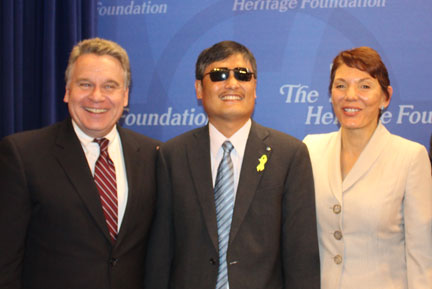
Congressman Chris Smith, Chinese activist Chen Guangcheng, and Women’s Rights Without Frontiers President Reggie Littlejohn spoke out against coercive family planning in China at The Heritage Foundation in October 2014
By Bob Unruh
Republished with permission from World Net Daily
A women’s-rights activist battling China over its one-child policy says no one should be fooled by the communist government’s insistence that the practice has been “eased,” because the infamous forced abortions continue.
“The core of the problem is not whether the government is allowing one child or two children,” Reggie Littlejohn, president of Womens Rights Without Frontiers, told WND on Wednesday.
“The government is still telling how many children people can have and is enforcing that limit with coerced abortions,” she said. “And it’s not clear to me that there are fewer abortions. Women and babies still are dying.”
Littlejohn pointed out China still requires a birth permit for the first child and for the second child.
“Without a permit, there still are forced abortions, unless you’re rich enough to buy your way out,” she said.
Her organization has created an Internet petition calling for an end to forced abortions.
Littlejohn’s frustration stems from things like a recent China Daily headline that stated “Shanghai couples urged to have 2nd children.”
Some organizations are declaring such headlines a “victory” in the fight against the restrictive nation’s one-child policy.
But Littlejohn said that “to proclaim victory while women and babies in China are dying – that is misleading.”
On Jan. 1, 2014, the Chinese Communist Party “tweaked” the policy that has brought forced abortion to hundreds of millions of women.
According to the new policy, some women – those who are only children themselves or have a husband who is an only child – are being allowed a second child, if they obtain permission.
Littlejohn noted one non-profit organization recently released a statement that it “would like to celebrate and rejoice” in the “victory” that additional babies have been born under the most recent exception.
“Their statement – and the reports published in the mainstream media – do not mention the fact that the Chinese Communist Party has made no promise whatsoever to end coercive birth control,” she said.
In fact, the government said at the same time it was urging couples to have more children that National Health and Family Planning Commission officials said in November 2014 that China had no plans to suspend or further relax its one-child policy.
Blind activist Chen Guangcheng, at a Heritage Foundation event last fall, described the brutal government practices.
“In today’s China, under the communist rule, the government can put their hand into your body, grab your baby out of your womb, and kill your baby in your face,” he said.
At the same event, Rep. Chris Smith, R-N.J., said it was “the most egregious, vicious attack on women ever.”
China’s one-child policy announced in 1979 is state-sponsored violence against women and children – including and especially the girl child – and constitutes massive crimes against humanity,” Smith said.
Littlejohn said the “coercive enforcement of the one-child policy continues unabated, destroying women, children, whole families – and indeed, the fabric of Chinese society.”
“It constitutes the greatest women’s rights violation on the face of the earth and in the history of the world. Whether you are pro-life or pro-choice, no one supports forced abortion, because it is not a choice. The one-child policy does not need to be ‘eased.’ It needs to be abolished.”
Her organization has monitored some of the policy’s consequent horrors, including murder and suicide, that still are prevalent.
For example, parents who don’t have a permit for a child sometimes are charged “social compensation fees” of up to 14 times a person’s annual salary.
Without making those payments, however, the children are denied health care and education.
Most abuses from the policy never are reported, she said, but among some cases that did come to light:
- A man in the Guangxi Region stabbed to death two government workers because they told him he could not registered his child without paying the fees.
- In Hunan Province, a husband demanded compensation from the Chinese government, claiming that his wife, Gong Qifeng, has suffered from schizophrenia and violent behavior since she was forcibly aborted at seven months in November 2011.
- A farmer in Hebei Province who did not have the money to pay the extra fines and fees committed suicide by drinking pesticide “during a dispute with family planning officials.”
- And an obstetrician in Shaanxi province, Zhang Shuxia, was convicted of trafficking seven infants after she had convinced their parents that the infants were seriously ill or deceased. She was given a suspended death sentence.
“The minor modification of the policy that took place on January 1, 2014: 1) does not affect a large percentage of couples in China; 2) retains the dreaded ‘birth intervals’ between children (if a woman gets pregnant before the interval has lapsed, she may be subject to forced abortion); and 3) makes no promise to end the coercive enforcement of the policy,” Littlejohn said in a statement.
“To proclaim ‘victory’ under these circumstances is entirely unwarranted and may mislead many into thinking that the One Child Policy is a thing of the past,” her statement said.
“This is a time to increase pressure for change, not to release it,” she said.
WND reported Littlejohn’s criticism of Washington’s decision to promote China from Tier 3 to Tier 2 status on its watch list of human rights violators.
“The Chinese government’s efforts to remedy the problems that brought it to a ‘Tier 3′ status range from ineffective to non-existent,” Littlejohn said at the time.
Her new comments followed the release by Washington of its 2014 Trafficking in Persons report.
“The report appears to attribute this promotion to a technical modification of the one-child policy,” Littlejohn said.
The State Department reasoned that the Chinese government “maintained efforts to prevent trafficking in persons.”
“In November 2013, the government modified its birth limitation policy to allow families with one single-child parent to have a second child, a change that may affect future demand for prostitution and for foreign women as brides for Chinese men – both of which may be procured by force or coercion. TIP Report, p. 134.”
Littlejohn said the fact that China “tweaked” the policy “does not signify that it ‘maintained efforts to prevent trafficking in persons.’”
“Allowing a relatively small number of families to have a second child will not end gendercide or sexual slavery in China,” she said.
“The selective abortion and abandonment of baby girls is most prevalent in the countryside, where couples already can have a second child if the first child is a girl,” Littlejohn said. “Even if the most recent modification were to improve gender ratios at birth, the impact on sexual slavery would not be felt for decades to come.”
Read original article at wnd.com: http://www.wnd.com/2015/02/women-still-dying-after-chinas-1-child-policy-eased/




